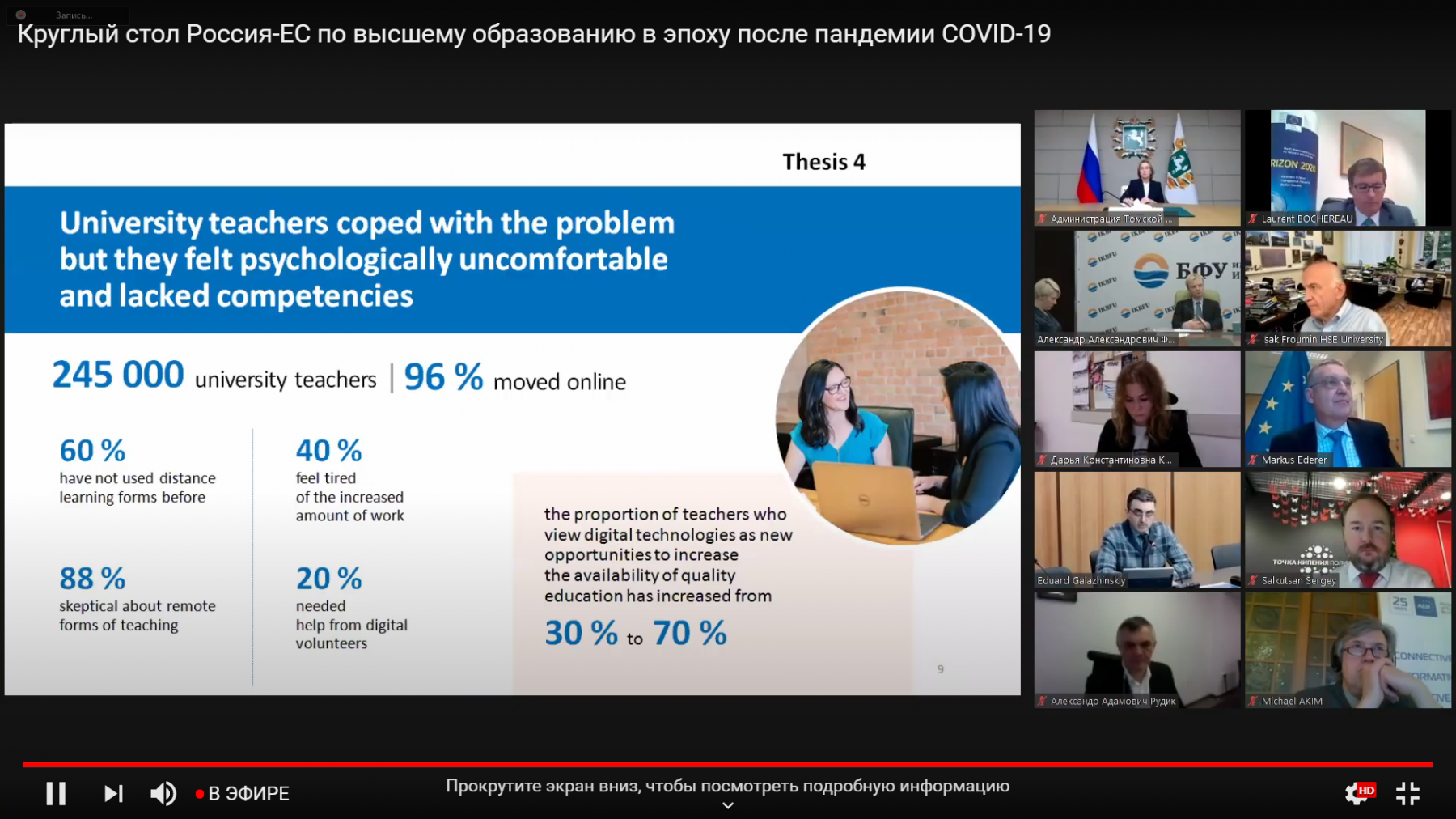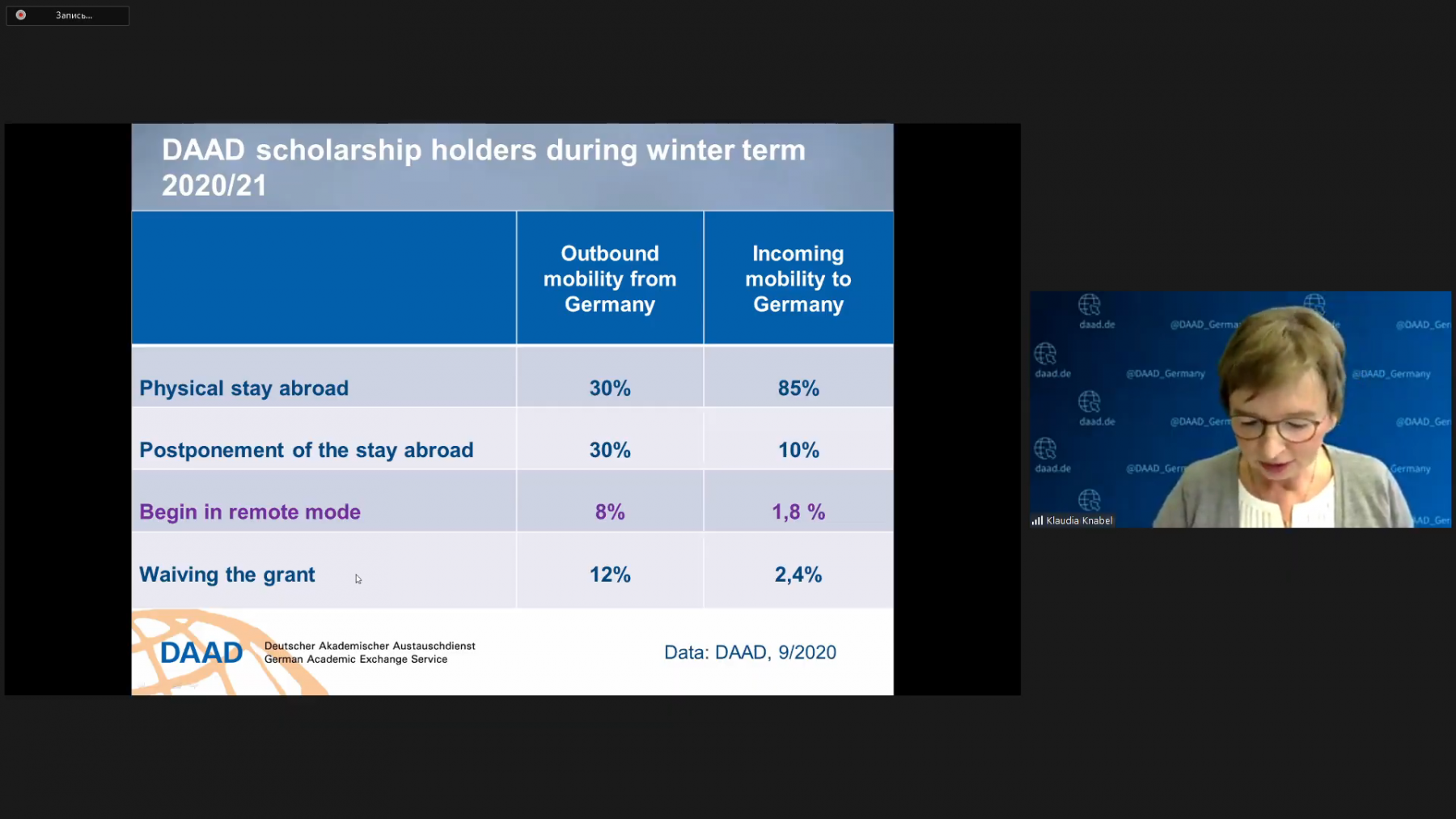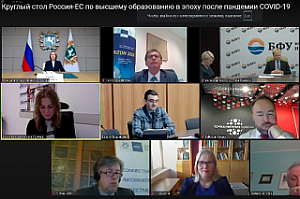Russian and European experts discussed the development of the education system in the context of a pandemic at the round table New Models of Educational Process Organisation, Novel Educational Practices and Internationalisation in the Post-COVID Reality, organized by TSU. The best Russian and European practices will be used to develop national educational policies. The table was organized by TSU, the EU Delegation to the Russian Federation, and the administration of the Tomsk Region.
- We need to remain vigilant and prepare for the post-covid era. The new reality will be different, and the possibility of a new pandemic cannot be ruled out. And we need to think about how to provide quality education to students in these conditions. In this regard, I am very interested in the conclusions and recommendations of the round table, - said Markus Ederer, the EU Ambassador to Russia opening the event.
Natalya Trukhanovskaya, director of the Department for Coordination of the Activities of Higher Education Organizations of the Ministry of Education and Science of Russia, also supported him, stressing the importance of practices that will be useful not only "in emergency conditions", but also in the future.
The discussion was held in three thematic areas: NEW CHALLENGES FOR THE EDUCATIONAL PROCESS, ACADEMIC MOBILITY, and SAFE CAMPUS. Representatives of 7 Russian universities, including TSU, 7 universities of the EU countries, student associations, employers, and organizations of international scientific and educational cooperation attended the roundtable. Also, members of the European Commission and the Association of European Universities joined the discussion.
Eduard Galazhinsky, TSU Rector, spoke about how the education system should develop further - at the level of both universities and the regulator. By taking prompt measures, the Russian education system was able to prevent the spread of coronavirus: the number of cases in universities is one-third of3 times less than the national average, and at the same time, more than a million training courses were launched online.
- Horizontal communication between universities helped the education system to cope with problems, and we perceived the situation as a bifurcation point - but now we need to take the next step. For universities, for example, to introduce digital assistants, and the Ministry of Education and Science, in particular, to develop inter-university and international mobility, the Rector summed up.

Stefan Hermans, director of policy strategy and evaluation in the Directorate-General for Education, Youth, Sport, and Culture of the European Commission, spoke about how the EU countries are taking into account the experience of the pandemic in education planning. He clarified that digital education is developing very quickly in Europe, although it cannot replace full time education, and the pandemic will radically change the educational landscape. Hermans noted that one of the priorities in European countries next year will be express training programs, in which people will be able to improve their qualifications in various areas in a short time or get a new specialty.
- Such short programs should be recognized by employers, - added Hermans, and he summed up: - Let's learn (live in new conditions) through cooperation programs between the Russian Federation and the EU.
Philippe Morin from the Ecole Normale Supérieure de Lyon (France) spoke about the new challenges that require the introduction of new pedagogy. In particular, on the development of new ways of communication between students and teachers before and after classes, and the organization of virtual communication between groups of students at different levels, which should smooth out inequality and provide opportunities for cultural exchange.
The position of employers concerning universities in the post-pandemic era was formulated by Alexander Rudik, founder and president of the ProObraz Foundation. Universities must change, he says, to meet the demand for practical student training. The trend towards the abolition of higher education requirements for employment and competition between formal and non-formal education (online courses, corporate universities) is pushing universities to this.
Hanna Snellman, Vice-Rector of the University of Helsinki (Finland), reported one of the positive consequences of the pandemic: “The education system has adapted quite well to the pandemic, COVID has even stepped up our work to promote openness and transparency of education. And it gave the youth the impression of the necessary changes and reforms in the education system."
Claudia Knabel, head of the DAAD Northern Hemisphere scholarship program, spoke about the problems of academic mobility. With the pandemic, the number of mobility programs has sharply decreased, but there is a prospect for the development of virtual mobility. The demand for it, according to Knabel, is not too high among those scholars who counted on offline ed, but the new format will open up opportunities for students with children, people with physical disabilities, and for those who are entering the academic environment for the first time. It is difficult for these categories of people to mobilize financial and time resources to participate in mobility programs, and therefore they find themselves in a less advantageous position in the labor market.

“But the students still want full immersion in the host country, so we hope for the resumption of programs between Russia and Germany,” Ms. Knabel emphasized.
In connection with the COVID-19 pandemic, systemic problems have emerged that can lead to instability in campus life in the medium term - a separate section was devoted to setting up a safe campus. The participants discussed the issues of a sustainable green campus, its new functions, and resources, new virtual communication spaces, mental health services, special control over the safety, and other topics.
The report of the round table will be approved at the meeting of the working group in early December.
The video of the round table is available on the TSU YouTube channel in English and Russian.
Wolfgang Mastnak's presentation
Nikita Anisimov's presentation
Thomas Estermann's presentation

